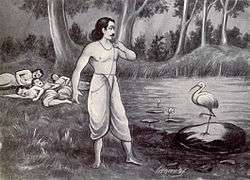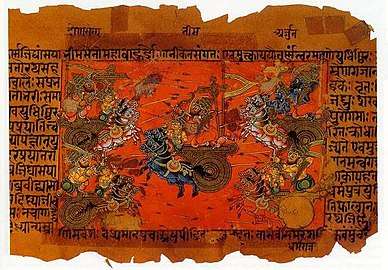Yaksha Prashna
The Yaksha Prashna, also known as the Dharma Bka Upakhyan or the Akshardhama, is the story of a riddle contest between Yudhishthira and a yaksha in the Hindu epic Mahabharata. It appears in the Vana Parva, Aranyaka-parva or Araneya-parva and the story is set as the Pandavas end their twelve years of exile in the forest. "Riddle contest" is not a proper description to this episode as it is one way stream of questions like arrows from the Yaksha and instant responses from the learned Yudhishtira. There is not one "riddle" in it. The number of questions in the original Mahabharat in Sanskrit written by Sage Veda Vyasam is approximately 125.

| Part of a series on |
| Hindu scriptures and texts |
|---|
 |
|
Rig vedic
Sama vedic Yajur vedic Atharva vedic |
|
Other scriptures
|
| Related Hindu texts |
|
|
Timeline |
Vana Parva
At the end of their 12 years of exile in the forests, time had come for the pandavas to live in Agyat Vasa (living Incognito). As they were discussing their course of action the Pandava Princes came across a Brahmin who complained that a deer has taken on its antlers his Arani[1] – a pair of wooden blocks to generate fire by friction – and therefore he was not able to light the fire for the performance of Vedic rituals. The valorous Pandava Princes set out to retrieve the Brahmin's Arani and followed the hoof-marks of the deer.
In the quest of the mysterious deer, Yudhishthira, became exhausted and thirsty. His brother Nakula thus ventured out to fetch water and found a beautiful lake. The lake was devoid of any living creature except a crane (Baka). When he attempted to take water from the lake, the crane spoke, "O Nakula! The water of this lake will turn into poison if you take it without satisfactorily answering my questions." Nakula, in arrogance, did not pay heed and hurriedly took water from the lake. Upon drinking the crystal clear water, Nakula instantly died of poisoning. Nakula's twin Sahadeva, coming in search of his brother, also found the same lake, saw Nakula dead, and was warned by the crane. But Sahadeva too ignored the crane and died after drinking the water. In the same manner, both valiant Arjuna, and powerful Bhima met the same fate.
Since none of the brothers returned with water, Yudhishthira engaged in search of them. Upon following the same path, Yudhishthira came across the lake and found his brothers lying dead. Before searching for the killer of his brothers, Yudhishthira decided to drink some water from the lake. But when the crane warned him, Yudhishthira realised that the crane held the answer to the turn of events. The virtuous Yudhishthira proceeded to answer the questions put forth by the crane.
Before putting the questions to Yudhishthira, the crane revealed itself as a Yaksha. The Yaksha asked 18 questions with philosophical and metaphysical ramifications. This dialogue between the Yaksha and Yudhishthira is embodied in the Madhya Parva of the Mahabharata, and is also known as the Dharma-Baka Upakhyan (Legend of the Virtuous Crane).
Baka Prashna/Yaksha Prashna: (The Questions of the righteous Crane or the Yaksha)
Question 1.
The Yaksha asked Yudhisthira, "Who makes the sun rise and ascend in the skies? Who moves the Sun around? Who makes the sunset in the horizons? What is the true nature of the Sun and where is the Sun established"?
Yudhishthira answered, "Brahma makes the sun rise and ascend. The Gods perambulate about the Sun. The Dharm sets the Sun. Truth is the actual Sun and the Sun is established in Truth only".
Question No. 2:
Yaksha enquired: What instils 'divinity' in Brahmins? What is the quality of virtuosity in a Brahmin? What is the humanlike quality of a Brahmin? What is the conduct akin to a non-virtuous person in a Brahmin?
Yudhisthira replied: The self-study (Swadhyayana) of the Vedas is divinity in a Brahmin. Penance is the quality like a virtuous person in a Brahmin. Death is human-like quality in a Brahmin. Criticising others is conduct in a Brahmin like a non-virtuous person.
Question 3.
The Yaksha asked, "What instils divinity in Kshatriyas? What is the quality of virtuosity in a Kshatriya? What is the humanity of a Kshatriya? What is the conduct akin to a non-virtuous person in a Kshatriya"?
Yudhishthira replied, "The art of archery instils divinity in a Kshatriya. Oblation is the quality of virtuosity in a Kshatriya. Fear is his humanity. Abandoning people under the protection of the Kshatriya is conduct akin to a non-virtuous person in the Kshatriya".
Question 4.
The Yaksha asked, "What is that thing which is like Mantra in the performance of oblations (Yajna)? Who is the performer of rites and ceremonies during Yajna? Who accepts the offerings and oblations of a Yajna? What is that which even a Yajna can not transgress"?
Yudhishthira replied, "Breath is like Mantra in the performance of rites. The mind is the performer of all rites in the course of Yajna. Only Shlokas of the Vedas, termed rucha or the richa accept oblation. The Yajna cannot surpass nor transgress the richas".
Question 5.
The Yaksha asked, "What is heavier than Earth, higher than heavens, faster than the wind and more numerous than straws"?
Yudhishthira answered, "One's mother is heavier than the Earth, one's father is higher than the heavens, the mind is faster than the wind and our worries are more numerous than straws ".
Question 6.
The Yaksha asked, "Who is the friend of a traveller? Who is the friend of one who is ill and one who is dying"?
Yudhishthira's response, "The friend of a traveller is his companion. The physician is the friend of one who is sick and a dying man's friend is charity".
Question 7.
The Yaksha asked, "What is that which, when renounced, makes one lovable? What is that which is renounced makes happy and wealthy"?
Yudhishthira replied, "Pride, if renounced makes one lovable, renouncing desire one becomes wealthy and to renounce avarice is to obtain happiness".
Question 8.
The Yaksha asked, "What enemy is invincible? What constitutes an incurable disease? What sort of man is noble and what sort is ignoble"?
And Yudhishthira responded, "Anger is the invincible enemy. Covetousness constitutes a disease that is incurable. He is noble who desires the well-being of all creatures, and he is ignoble who is without mercy".
Question 9.
The Yaksha asked, "Who is truly happy? What is the greatest wonder? What is the path? And what is the news"?
Whereupon Yudhishthira replied, "He who has no debts is truly happy. Day after day countless people die. Yet living wishes to live forever. O Lord, what can be a greater wonder? Argument leads to no certain conclusion, the Srutis are different from one another; there is not even one Rishi whose opinion can be accepted by all. The truth about Dharma and duty is hidden in the cave of our hearts, therefore that alone is the path along which the great have trod. This world full of ignorance is like a pan. The sun is fire, the days and nights are fuel. The months and the seasons constitute the wooden ladle. Time is the cook that is cooking all creatures in that pan (with such aids). This is the news".
Even though Yudhishthira had answered all questions in a satisfactory manner, the Yaksha only allowed him to choose one of his brothers to be living.
Yudhishthira said, "I choose my younger brother, Nakula"
When the Yaksha asked him why he chose Nakula when he could choose sharp Arjuna or brave Bheema
Yudhishthira replied, "I love Kunti, my mother and Madri, my stepmother equally, If I choose my blood brothers it will give injustice to Madri, hence I choose Nakula.
The Yaksha was impressed by how Yudhishthira followed Dharma in every little thing he did. At the end of the questions, the Yaksha revealed himself to be Yama-Dharma, the god of death, who was none other than Yudhishthira's father. He also admitted to Yudhishthira that it was he who had stolen the arani disguised in the form of the deer. He blessed him saying since he had adhered to Dharma (righteousness), the Dharma would protect them and no-one would recognise them during the Ajnata Vasa. [1]He also got his brothers back from heaven.
See also
- Yudhishthira
- Yaksha Kingdom
- Yama Dharma
References
- Dictionary of Hindu Lore and Legend by Anna Dallapiccola
- Encyclopedia of Hinduism Ed. by Dr. Nagendra Kr. Singh
1. http://www.hindupedia.com/en/Yaksha_Prasnam 2. https://play.google.com/books/reader?id=CBrjCgAAQBAJ&printsec=frontcover&pg=GBS.PT247
External links
- English translation at Dharma Sastra.
- Sanskrit and English, A4 and tablet PDFs with notes and links at the Matheson Trust.
- English Translation by Kisari Mohan Ganguli at Sacred Texts.
